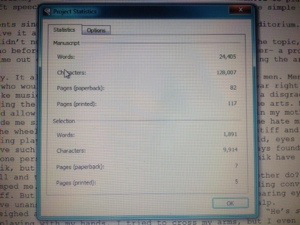Word counts? How important are they?
For as long as I’ve been a part of writing communities, I’ve been surprised by how intensely focused everyone is on their word counts. NaNoWriMo? Based solely on word count. Writing sprints? Based on word count (most of the time). Genre? Has preferred word counts. Novels? Novellas? Short stories? Flash fiction? All based on word count.
Success is linked to word count, and I can see why. In the technical and business sense of it all, word count is beyond important. But I am of the variety which couldn’t care less about word counts. If you’ve ever read my editing technique posts (#1 and #2), then you know I start all of my projects on paper, then move up to typewriter, where I then finish on the computer. It’s a long, drawn-out process, but it gets the job done. Paper has no word count, typewriters (unless they are of the modern variety) have no word counts. I usually don’t know my final word count until the draft is already complete and has gone through two edits. I, personally, hate word counts. I feel like they are stifling to writers, though some people find them to be helpful, and keep them motivated.
Though it is against my own personal preference, I’ve decided to make a list detailing why word counts are so important (though I still say write how much you want to write. Write until the story is done, and all that jazz). Anyway, before I change my mind, ONWARD TO THE LIST!
Most Literary Journals take Fiction of a Certain Length
Granted, most of these journals also have themes people can write for, but it’s still worth noting. I’ve found that most literary journals will take lengths ranging from 5,000 words to approximately 10,000, though that is pushing it. They prefer shorter works because the lengthier the journal, the more expensive it is to print. If you’re looking to get into a journal, it’s best to follow their guidelines exactly. If they prefer a certain word count, it would be in your best interest to meet that word count.
Most Presses take Fiction of a Certain Length
Same goes for big name presses. They want big books. The bigger the book, the more money there is to be had. It has been statistically proven that people like buying bigger books. So, the bigger the book, the better (most of the time).
Genre Presses always have a Length Preference
Most YA presses want lengths in the 50,000 to 100,000 word range. Most sci-fi presses want 100,000 to 300,000. Fantasy can go from 50,000 to 500,000. It all depends on how strict the press is and what they believe is the ample word count for the specific genre they are hoping to publishing. It is important to keep in mind the genre you are writing for because that will also determine how much you need to write.
Word Counts are Encouraging
There is a reason NaNoWriMo is always so successful. People like having a specific number to achieve. It’s similar to why I like making lists. I like being able to reach something, to have a specific goal I can aspire to. Thus, setting a word count goal can help to encourage your inner-writer. If you can’t seem to finish a draft, try setting daily word count goals or an entire draft goal. If you give yourself a specific deadline, you’ll have a better chance at achieving it.
Word counts are important, but in all honesty, write until the work is finished. There is no point in adding fluff and useless info just to reach a word count goal. If you finish the draft, then it’s done. Same goes for cutting things out. If you think the work is as complete as it’s going to get, once editing is done, then don’t worry about trimming it down. Now, just for those who are interested. I’ve added a list of common, general words counts for genres and book sizes below. These aren’t set in stone. Each press usually has a different interpretation as to how many words a genre needs, but this can be a fairly accurate place to jump from.
Novel – over 40,000 words
Novella – 17,500 to 40,000 words
Novelette – 7,500 to 17,500 words
Short story – under 7,500 words
Middle Grade Fiction – 25,000 to 40,000
YA Fiction – 45,000 to 100,000 (possibly 120,000)
Paranormal Romance – 85,000 to 100,000
Romance – 85,000 to 100,000
Category Romance – 55,000 to 75,000
Mysteries – 65,000 to 90,000
Horror – 80,000 to 100,000
Western – 80,000 to 100,000
Thrillers and Crime Fiction – 75,000 – 100,000
Mainstream/Commercial Fiction – 50,000 to 120,000
Science Fiction and Fantasy – 80,000 to 120,000
Now then, what do you think about word counts? How important are they to you? How strict are you with them? Are you like me and couldn’t care less about them? Let me know, and comment below!
Thanks for reading.
-Lissy
Have a request for a blog post topic? Just wanna ask a question? Go to my Home page, fill out the contact sheet, and shoot me an email! I look forward to hearing from you.
Filed under: Writing and Marketing Tips, Writing Tips








Alyssa Hubbard's Blog
- Alyssa Hubbard's profile
- 22 followers




